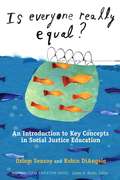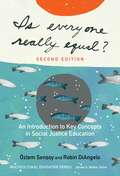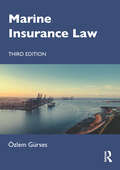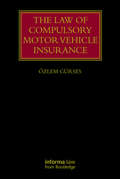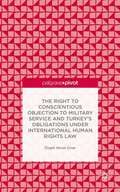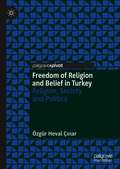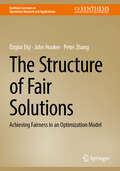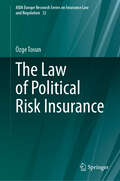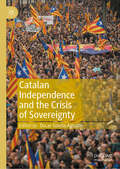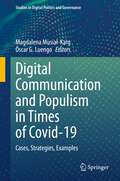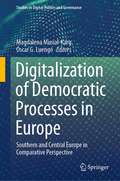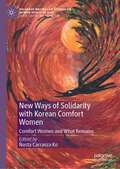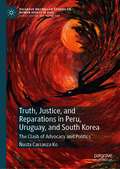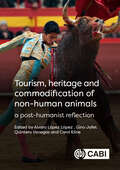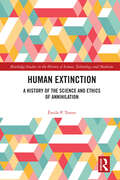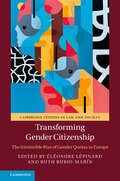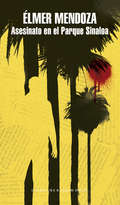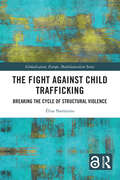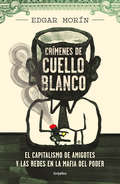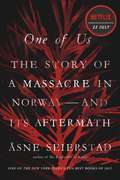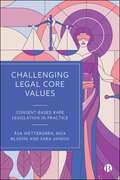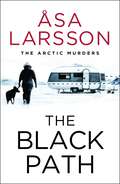- Table View
- List View
Is Everyone Really Equal? An Introduction to Key Concepts in Social Justice Education
by Özlem Sensoy Robin DiangeloThis practical handbook will introduce readers to social justice education, providing tools for developing "critical social justice literacy" and for taking action towards a more just society. Accessible to students from high school through graduate school, this book offers a collection of detailed and engaging explanations of key concepts in social justice education, including critical thinking, privilege, and White supremacy. Based on extensive experience in a range of settings in the United States and Canada, the authors address the most common stumbling blocks to understanding social justice. They provide recognizable examples, scenarios, and vignettes illustrating these concepts. This unique resource has many user-friendly features, including "definition boxes" for key terms, "stop boxes" to remind readers of previously explained ideas, "perspective check boxes" to draw attention to alternative standpoints, a glossary, and a chapter responding to the most common rebuttals encountered when leading discussions on concepts in critical social justice. There are discussion questions and extension activities at the end of each chapter, and an appendix designed to lend pedagogical support to those newer to teaching social justice education.
Is Everyone Really Equal?: An Introduction to Key Concepts in Social Justice Education
by Özlem Sensoy Robin DiAngelo<P>This is the new edition of the award-winning guide to social justice education. Based on the authors' extensive experience in a range of settings in the United States and Canada, the book addresses the most common stumbling blocks to understanding social justice. <P>This comprehensive resource includes new features such as: a chapter on intersectionality and classism, discussion of contemporary activisms (Black Lives Matter, Occupy, and Idle No More), material on White Settler societies and colonialism, pedagogical supports related to "common social patterns" and "vocabulary to practice using," and extensive updates throughout. <P>Accessible to students from high school through graduate school, Is Everyone Really Equal? is a detailed and engaging textbook and professional development resourcer presenting the key concepts in social justice education. The text includes many user-friendly features, examples, and vignettes to not just define but illustrate key concepts.
Marine Insurance Law
by Özlem GürsesMarine Insurance Law introduces and clearly explains all topics covered in undergraduate and postgraduate-level courses, offering students and those new to the area a comprehensive and accessible overview of this important topic in maritime law. Observing the general principles of the subject and structure and formation of insurance contracts, this text goes on to look at individual considerations in detail, including the duty of utmost good faith/fair presentation of the risk, insurable interest, terms of insurance contracts, warranties and conditions, brokers, the premium, causation and marine perils, losses, sue and labour, subrogation, fraudulent claims, and reinsurance. The third edition has been fully updated and expanded to cover additional pre-Marine Insurance Act 1906 (MIA 1906) cases, as well as the implications of the Insurance Act 2015 on the duty of fair presentation of the risk in business insurance and on the remedy for breach of a warranty. The reader will also read about the emphasis placed by the UK Supreme Court on the construction of s. 55 of the MIA 1906, and the challenges faced in respect of claims for a constructive total loss of the subject matter insured, which are especially current at the time the book is being prepared for its publication. This textbook is the ideal companion for any student, academic, and practitioner wishing to study the subject and to explore more detailed information on the principles of marine insurance law.
The Law of Compulsory Motor Vehicle Insurance (Lloyd's Insurance Law Library)
by Özlem GürsesThe Law of Compulsory Motor Vehicle Insurance covers motor vehicle compulsory liability insurance in a broad context by putting emphasis on the fundamental principles unique to this type of insurance, their operation together with the general principles of law, and the interventions of the relevant EU Directives and CJEU decisions. The law regarding motor vehicle liability insurance is ever-evolving, fast-developing and offering more intellectual challenges as the disputes vary every day. This book examines the principles applicable in this area of law by studying the grounds where the rules derive from and their continuing developments over decades at both domestic and EU levels. Whilst doing so it also discusses whether the sources of the current applicable law, in several different motor vehicle compulsory insurance related issues, are in line with each other. The book also presents careful analyses of the interplay between the different sources of law, detailed discussions on what the law should be in order to provide consistency amongst the rules and principles identified, and how solutions to newly emerging issues can be found. The regime applicable in this area is overcomplex. This book will be valuable reading for any lawyer, whether academic, practitioner or student who would like to understand the insurance cover required for compulsory motor vehicle third party liability insurance together with the rationale for adopting such rules and their interpretation by the Courts.
The Right to Conscientious Objection to Military Service and Turkey’s Obligations under International Human Rights Law (Palgrave Pivot)
by Özgür Heval ҪinarThis study examines Turkey's non-recognition of the right to conscientious objection to military service and locates this non-recognition within the context of international human rights law - specifically United Nations and European Union system.
Freedom of Religion and Belief in Turkey: Religion, Society and Politics
by Özgür Heval ÇınarThe freedom of thought, conscience, and religion, from which stem the tenets of pluralism, tolerance, and open-mindedness, are some of the most basic freedoms of a democratic society. This book illustrates the current state of the freedom of religion or belief in Turkey and the challenges and complex problems facing it, concentrating on the most topical issues: being compelled to reveal one’s religion and beliefs on the national identity card; the right of conscientious objection and conscientious objectors; compulsory religious education; recognition of faith groups and the opening of places of worship; and using and wearing religious symbols and dress in the public sphere.
Conscientious Objection to Military Service in International Human Rights Law
by Özgür Heval ÇinarThis book examines the right to conscientious objection in international human rights law. It begins with an exploration of the concept of conscience and its evolution. Özgür Heval Çinar analyzes human rights law at both the international and regional level, considering UN, European, and inter-American mechanisms.
The Structure of Fair Solutions: Achieving Fairness in an Optimization Model (Synthesis Lectures on Operations Research and Applications)
by John Hooker Özgün Elçi Peter ZhangThis book provides a novel and unifying perspective on the structural properties of fair solutions in optimization formulations. The book also addresses a growing interest in incorporating fairness into the models that lie behind many business and public policy decisions. Since there are several ways to formulate fairness mathematically, the authors characterize optimal solutions that result from different formulations with the aim of informing the choice of an appropriate model for a given application. The focus is on fairness criteria that combine efficiency with fairness since typically both are important in practice. Most of these results are new and do not appear in the current literature. The book is directed towards a wide range of audiences including practitioners, researchers in mathematical optimization, and welfare economists. In addition, this book: Presents practical linear, nonlinear, or mixed integer programming formulations and a wide variety of fairness models Includes detailed proofs that provide insight into the properties of each criterion Provides guidelines for selecting a fairness model and the tendency to incentivize cooperation or competition About the Authors Özgün Elçi, Ph.D., is a Research Scientist on the Modeling and Optimization team at Amazon. John Hooker, Ph.D. is University Professor of Operations Research and T. Jerome Holleran Professor of Business Ethics and Social Responsibility, Emeritus, at Carnegie Mellon University. Peter Zhang, Ph.D, is an Assistant Professor at Carnegie Mellon University’s Heinz College of Information Systems and Public Policy.
The Law of Political Risk Insurance (AIDA Europe Research Series on Insurance Law and Regulation #12)
by Özge TosunThis book explores the scope of host states’ sovereign powers and the rights of foreign investors. Investors from developed countries engage in business with developing countries for various purposes, including political reasons, expanding and diversifying their operations, accessing essential natural resources and skilled labor forces, lowering their production costs, and in some cases, even mitigating global warming. Correspondingly, in order to attract foreign investment, host countries can provide incentives or make concessions. However, once the investment has been made, these ventures are vulnerable to the actions of the host state. Political risk insurance, as the name suggests, serves to protect investments made in foreign countries where the sovereigns are more likely to interfere in the business activities of foreign investors. This book offers a comprehensive understanding of the general mechanics of each main type of political risk, the entities responsible for these risks, insurers, their unions, and the subrogation process. Bridging the fields of investment law, insurance law, and international law, it offers valuable insights from both practical and academic perspectives.
Catalan Independence and the Crisis of Sovereignty
by Óscar García AgustínThis book explores the conflict between the Catalan project to become independent and the Spanish state’s opposition to any attempt of secessionism. The volume addresses some of the key political and academic issues of contemporary European societies: nationalism, separatism and sovereignty. The banned referendum in Catalonia in October 2017 unveiled the existence of multiple crises, from territorial to economic and political. Indeed, the Catalan issue is about the crisis of sovereignty: who holds legitimacy to make decisions, and who is in power legally and politically? The book is structured according to three themes: sovereignty and its people, where the realignment to independence, populism and the definition of the demos are discussed; collective identities and actions, to account for the shaping of ‘us’, the importance of collective memory and the cross-alliances forged during the referendum; and internationalization, focusing on Europeanisation, international media and comparative constitutional perspectives.
Digital Communication and Populism in Times of Covid-19: Cases, Strategies, Examples (Studies in Digital Politics and Governance)
by Magdalena Musiał-Karg Óscar G. LuengoThis book examines different dimensions of digital communication and populism in times of the COVID-19 pandemic. While doing so, it discusses views, opinions, and research results regarding the conditions, experiences, constraints, benefits, and challenges related to the topic - not only using theoretical and methodological approaches but also practical perspectives. The COVID-19 (SARS-CoV-2) pandemic significantly accelerated the technological revolution presenting many social, economic, and political challenges, as it pushed the world into cyberspace to ensure social distancing. At the same time, many populist protests expressed in the digital public sphere massively gained importance during the lockdowns. As a result, one of the most significant consequences of using electronic tools is not only greater e-participation of citizens, but - especially evident through elections during a pandemic - even greater transfer of political communication and election campaigns into the space of new media. The book broadly analyses various contexts of digitalization of communication processes and populist politics from both theoretical and empirical perspectives in various case studies on the digitalization of information, communication, or participation processes during the COVID-19 pandemic in selected European countries and beyond. This book will appeal to students, researchers, and scholars of political communication, political science, electoral studies, digital politics, and democracy, as well as policy-makers interested in a better understanding of digital communication and populism during the Covid-19 pandemic.
Digitalization of Democratic Processes in Europe: Southern and Central Europe in Comparative Perspective (Studies in Digital Politics and Governance)
by Magdalena Musiał-Karg Óscar G. LuengoThis book explores the digital transformations of democracy and democratic societies. It examines the various challenges posed by these transformations in the context of political practice and to theoreticians of democracy and political communication. The authors present studies from different countries, related to various effects of digitalization processes. Topics covered include, but are not limited to: Innovation in civil society research, new forms of civic participation, new dimensions of democratization and local governance processes, political changes and public participation, civic and political activities, political campaigning or other phenomenon driven by the implementation of information and communications technology (ICT) into politics. Therefore, the book is a must-read for all scholars and researchers of political science, practitioners, and policy-makers, interested in a better understanding of digital politics, digitalization processes, and democracy in general.
New Ways of Solidarity with Korean Comfort Women: Comfort Women and What Remains (Palgrave Macmillan Studies on Human Rights in Asia)
by Ñusta Carranza KoThis book provides a space for victims’ testimonies and memories, engages with their experiences, reflects upon the redress movement, and evaluates policies related to Korean comfort women as victims and survivors from the international, domestic, and bilateral realms. Collectively, this edited volume aims to further diversify the scholarship on comfort women, contribute to the existing literature on social movements related to comfort women and other related studies, and, in doing so, challenge the politicization of comfort women. With this objective, the book presents scholarship from interdisciplinary fields that revisit the meaning of victims’ testimonies, memories, and remembrance, social movement efforts on comfort women, and the related role of government, governance, and society by reflecting on the truths about the historical past. In so doing, it initiates new conversations among political scientists, sociologists, historians, and cultural and literary scholars. What do victims’ testimonies reveal about new ways of imagining historical memory of Korean comfort women? How are memories of comfort women and their experiences remembered in social movements, literature, and cultural practices? Where is the place of comfort women’s experiences in politics, diplomacy, and global affairs? These are some of the questions that guide the contributions to this edited volume, which seek to establish new ways of solidarity with comfort women.
Truth, Justice, and Reparations in Peru, Uruguay, and South Korea: The Clash of Advocacy and Politics (Palgrave Macmillan Studies on Human Rights in Asia)
by Ñusta Carranza KoThis book presents the first cross-regional analysis of post-transitional justice periods and the conditions that influence states’ behaviors. Specifically, the book examines why states that adopt and ostensibly implement transitional justice norms as policies—criminal prosecutions, reparations policies, and truth commissions—fail to follow through with their recommendations. Applying these perspectives to a comparative study of states from Latin America and East Asia—namely, Peru, Uruguay, and South Korea—which accepted and implemented transitional justice norms but took different trajectories of behavior after the implementation of policies, this book contributes to understanding the relationship of norm influence on states and why states change in compliance after norm adoption. The book explores the conditions that contribute or limit the continued respect for transitional justice norms, emphasizing the political interests and transnational advocacy networks’ roles in affecting states’ policies of addressing past abuses.
Tourism, Heritage and Commodification of Non-human Animals: A Posthumanist Reflection
by Alejandro Morales Carolin Funck Gustavo Ortiz-Millán Johan Edelheim Bobbie Chew Bigby Tomas Arias Jean Azcatl Pineda Alicia Mariana Pérez Émilie Crossley Georgina Flores Leonardo Garavito-González Yulei Guo Dr Jes Hooper Brenda Martínez Velasco Mateo Nicolás Medina Jorge Iván Barrera Javed Salim Estephania Sepúlveda Perdomo Rie Usui David A. Varela-Trejo Nusrat YasmeenHeritage is a social construction rooted in modern and contemporary societies. It is commonly a positive assessment of many elements of the physical and human environment (e.g. ecosystems and landscapes, monuments, customs, gender norms, religious practices, gastronomy, and livelihoods). Heritage and tourism are strongly related to each other in that heritage gives rise to tourist attractions and activities, and tourism enhances the designation of heritage sites. Non-human animals (hereafter 'animals') are present as implicit or explicit heritage elements through multiple tourist environments: animals may be themselves the heritage focus of tourist interest (visual arts, gastronomy, as charismatic and distinguished beings, as part of festivities or rituals), or it may be that animals are agents involved in heritage tourist environments such as working animals or in recreational activities. A post-humanist perspective the moral valuation of equality between humans and other animals demands that both are sentient beings and self-aware of their pain and pleasure. Thus, the involvement of animals as heritage elements by themselves or as an element of tourist consumption in heritage sites implies their commodification and lack of agency. As such, these practices are usually unethical, since they threaten the animals' primary interests: not to suffer, not to feel pain and to be able to live their freedom. This book contains chapters that reveal both the unethical interactions between humans and animals within heritage tourism, and those that show experiences in which efforts are made to minimize damage within the commercialization of animals involved as heritage themselves. It will be of interest to postgraduate students, academics, NGOs and tourism planners.
Human Extinction: A History of the Science and Ethics of Annihilation (Routledge Studies in the History of Science, Technology and Medicine)
by Émile P. TorresThis volume traces the origins and evolution of the idea of human extinction, from the ancient Presocratics through contemporary work on "existential risks." Many leading intellectuals agree that the risk of human extinction this century may be higher than at any point in our 300,000-year history as a species. This book provides insight on the key questions that inform this discussion, including when humans began to worry about their own extinction and how the debate has changed over time. It establishes a new theoretical foundation for thinking about the ethics of our extinction, arguing that extinction would be very bad under most circumstances, although the outcome might be, on balance, good. Throughout the book, graphs, tables, and images further illustrate how human choices and attitudes about extinction have evolved in Western history. In its thorough examination of humanity’s past, this book also provides a starting point for understanding our future. Although accessible enough to be read by undergraduates, Human Extinction contains new and thought-provoking research that will benefit even established academic philosophers and historians.
Transforming Gender Citizenship: The Irresistible Rise of Gender Quotas in Europe (Cambridge Studies in Law and Society)
by Ruth Rubio-Marín Éléonore LépinardGender quotas are a controversial policy measure. However, over the past twenty years they have been widely adopted around the world and especially in Europe. They are now used in politics, corporate boards, state and local public administration and even in civil society organizations. This book explores this unprecedented phenomenon, providing a unique comparative perspective on gender quotas' adoption across thirteen European countries. It also studies resistance to gender quotas by political parties and supreme courts. Providing up-to-date comprehensive data on gender quotas regulations, Transforming Gender Citizenship proposes a typology of countries, from those which have embraced gender quotas as a new way to promote gender equality in all spheres of social life, to those who have consistently refused gender quotas as a tool for gender equality. Reflecting on divergences and commonalities across Europe, the authors analyze how gender quotas may transform dominant conception of citizenship and gender equality.
Asesinato en el Parque Sinaloa
by Élmer MendozaUna nueva entrega de la saga del Zurdo Mendieta y un relato trepidante en el que la violencia, el narcotráfico, la corrupción y el amor se entretejen en un retrato perfecto del presente de nuestro país. Edgar «el Zurdo» Mendienta ha decidido retirarse de las fuerzas policiales. Desencantado y hastiado por la violencia, parece sucumbir ante el consumo autodestructivo de whisky, cuando Abel Sánchez, viejo amigo y mentor, hace que vuelva como detective por un favor al que El Zurdo no puede negarse: hallar al asesino de su hijo, el abogado Pedro Sánchez Morán, quien fue encontrado muerto en el Parque Sinaloa. La policía de Los Mochis cerró el caso sin investigación alguna, pues dan por hecho que Pedro fue asesinado por su novia, la también abogada Larissa Carlón, cuya muerte reciente fue asumida como suicidio. Elementos de la Marina patrullan Los Mochis; el Perro Laveaga, cabecilla del cártel delPacífico, se ha fugado de la prisión de máxima seguridad de Barranca Plana y todo parece indicar que está escondido en alguna parte de la ciudad. El poderoso narcotraficante está actuando con imprudente descuido; confía demasiado en el Grano Biz, su lugarteniente en la zona, y, además, su obsesión por una mujer lo tiene trastornado. El deseo más grande del Perro es reencontrarse con Daniela K, locutora de gran audiencia, quien ha prometido hacer una radionovela sobre la vida del capo. Asesinato en el Parque Sinaloa es un laberinto de intrigas y complicidades, de senderos que convergen en la pasión y el crimen. Élmer Mendoza nos entrega una obra maestra del género, una novela vertiginosa que nos recuerda que la pregunta fundamental de la literatura policiaca es la misma del amor: ¿quién diablos es el culpable?
Without Offending Humans: A Critique of Animal Rights (Posthumanities #24)
by Élisabeth de FontenayA central thinker on the question of the animal in continental thought, Élisabeth de Fontenay moves in this volume from Jacques Derrida&’s uneasily intimate writing on animals to a passionate frontal engagement with political and ethical theory as it has been applied to animals—along with a stinging critique of the work of Peter Singer and Paola Cavalieri as well as with other &“utilitarian&” philosophers of animal–human relations.Humans and animals are different from one another. To conflate them is to be intellectually sentimental. And yet, from our position of dominance, do we not owe them more than we often acknowledge? In the searching first chapter on Derrida, she sets out &“three levels of deconstruction&” that are &“testimony to the radicalization and shift of that philosopher&’s argument: a strategy through the animal, exposition to an animal or to this animal, and compassion toward animals.&” For Fontenay, Derrida&’s writing is particularly far-reaching when it comes to thinking about animals, and she suggests many other possible philosophical resources including Adorno, Leibniz, and Merleau-Ponty.Fontenay is at her most compelling in describing philosophy&’s ongoing indifference to animal life—shading into savagery, underpinned by denial—and how attempts to exclude the animal from ethical systems have in fact demeaned humanity. But Fontenay&’s essays carry more than philosophical significance. Without Offending Humans reveals a careful and emotionally sensitive thinker who explores the unfolding of humans&’ assessments of their relationship to animals—and the consequences of these assessments for how we define ourselves.
The Fight Against Child Trafficking: Breaking the Cycle of Structural Violence (Globalisation, Europe, and Multilateralism)
by Élisa NarminioThis book analyses the contemporary effects of anti-trafficking policies on children trafficked for labour. It explores different dimensions of private and public apparatuses through which the governmentality of child trafficking manifests itself at a regional and interregional level. It investigates questions linked to the diffusion of the child trafficking norm between and within regions and stakeholders; to the criminalisation and vulnerabilisation of child traffickees; and to private governance of anti-trafficking initiatives, in particular concerning social sustainability of business supply chains. Drawing on extensive fieldwork with government, police, justice, civil society, multilateral organizations and businesses in the EU and in the ASEAN, the book argues that child traffickees are subjected not only to physical and psychological violence, but also to structural violence. The book concludes with suggestions to improve current anti-trafficking regimes. This book will be of key interest to scholars, students and practitioners in EU Studies, Southeast Asian Studies, Regionalism, Human Rights, Law, International Relations, and International Political Economy.
Crímenes de cuello blanco: El capitalismo de amigotes y las redes en la mafia del poder
by Édgar MorinLa mafia del poder sigue viva... y lucrando. Este es un libro sobre delitos cometidos por ciudadanos respetados, pero no respetables. Delitos que evidencian la existencia de pactos políticos y de impunidad a gran escala. Este es un libro sobre los crímenes de cuello blanco. Hoy, de hecho, la política y la alta empresa mexicana no se entienden sin este "capitalismo de amigotes", basado en favores, lazos de sangre, desigualdades y protección gubernamental. Y el daño financiero de esos crímenes es mucho más grande que el de toda la delincuencia "clásica". En esta obra, con nombres y apellidos, se muestra quiénes integran esas redes de privilegio, en qué negocios están metidos y qué historias arrastran. ¿Lo más impresionante? Que esa "mafia del poder" sigue operando, y algunos de sus integrantes tratan de incorporarse a las actuales esferas gubernamentales.
One of Us: The Story of Anders Breivik and the Massacre in Norway
by Sarah Death Åsne SeierstadOn July 22, 2011, Anders Behring Breivik detonated a bomb outside the Norwegian prime minister's office in central Oslo, killing eight people. He then proceeded to a youth camp on the wooded island of Utøya, where he killed sixty-nine more, most of them teenage members of the country's governing Labour Party. One of Us tells the story of this terrible day and its reverberations. Åsne Seierstad delves deep into Breivik's childhood, tracing the unlikely path that led him to become one of Europe's most reviled terrorists, and writes with equal intimacy about his victims. One of Us is at once a psychological study of violent extremism, a dramatic true crime procedural, and a compassionate inquiry into how a privileged society copes with homegrown evil. This is the true story of one of our age's most tragic events. Named "ONE OF THE BEST BOOKS OF THE YEAR" (2015) by THE NEW YORK TIMES'S BOOK REVIEW, NPR, THE BOSTON GLOBE, THE GUARDIAN, BUZZFEEED, PUBLISHERS WEEKLY, AND MEN'S JOURNAL. This book has also been made into the movie "22 July."
European Legal Cultures in Transition
by Grødeland, Åse B. and Miller, William L. Åse B. Grødeland William L. MillerAre national legal cultures in Europe converging or diverging as a result of the pressures of European legal integration? Åse B. Grødeland and William L. Miller address this question by exploring the attitudes and perceptions of the general public and law professionals in five European countries: England, Norway, Bulgaria, Poland and the Ukraine. Presenting new findings, they challenge the established view that ordinary citizens and people working professionally with the law have different legal cultures. Their research in fact reveals that the attitudes of citizens in Eastern and Western Europe towards 'law-in-principle' are remarkably similar, whereas perceptions of 'law-in-practice' differ by country and often correlate with GDP per capita and country ranking in rule of law indices. Grødeland and Miller's innovative methodological approach will appeal to both experts and non-experts with an interest in legal culture, European integration, or European elite and public opinion.
Challenging Legal Core Values: Consent-Based Rape Legislation In Practice
by Åsa Wettergren Moa Bladini Sara UhnooAvailable open access digitally under CC-BY-NC-ND licence. This book presents the first ethnographic study into a new consent-based rape law in Sweden and shows how the implementation of this legislation challenges outdated legal frameworks and requires a shift in legal practice. Focusing on the Swedish context, it provides insights that are globally applicable, offering lessons for other countries where consent-based rape laws are in place. By examining the limitations of the conventional legal enactment of autonomy, rationality and objectivity, the authors argue for an evolved approach to ensure fairness and effectiveness. Integrating feminist legal theory with the sociology of emotions, the book reveals how emotional and contextual factors shape legal reasoning. Aiming to make legal processes for sexual violence more transparent, predictable and democratic worldwide, this is an urgent call for enhanced professional training in emotional reflexivity and empathy.
The Black Path: Rebecka Martinsson: Arctic Murders – Now a Major TV Series
by Åsa LarssonThe novels that inspired Rebecka Martinsson: Arctic Murders - the major TV seriesOne of The Times' "Best Crime Novels by Women since 2000" "Rebecka Martinsson: the new Scandi-noir heroine to rival Saga Noren and Sarah Lund" iNews "In a television world now awash in female coppers, there aren't many as interesting and human as Rebecka" Wall Street JournalThe frozen body of a woman is found in a fishing ark on the ice near Torneträsk in northern Sweden. She has been brutally tortured, but the killing blow was clumsy, almost amateur. The body is quickly identified, raising hopes of an open-and-shut solution. But when a six-month-old suicide is disinterred, Rebecka Martinsson and Anna-Maria Mella find themselves investigating shocking corruption at the heart of one of Sweden's most successful mining companies. One that has powerful enemies of its own.
